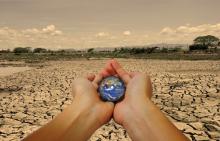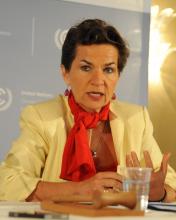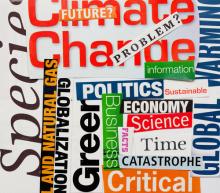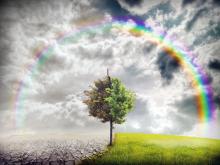Climate change
New results from the National Oceanic Atmosphere Administration show that July 2012 was the hottest summer on record for the United States, since accurate record keeping began in 1895. With an average temperature of 77.6 degrees Fahrenheit, last month's heat wave surpassed July 1936 (which recorded an average of 77.4) to become the steamiest summer around.
In a report on NBC, NOAA climate scientist Jake Crouch explains:
"These events are kind of what we'd expect with climate change, we'd expect expanding drought, we'd expect warm, record breaking temperatures… But it's kind of hard to pinpoint this month or past several months as a telltale sign that climate change is happening. The drought is more of a local factor and isn't necessarily driven by large scale climate change, but is impacting local temperatures. But we've also seen an increase in U.S. temperatures overall."

Last month, Rolling Stone magazine featured Bill McKibben's latest plea for climate sanity on its cover. And despite every pundit's whining proclamation that climate change is such a buzz-kill, Bill's article got forwarded, commented, tweeted, and otherwise pushed around the Internet more than anything else RS has put out lately.
So somebody out there is paying attention to climate change — even if the elites can't seem to grow a spine about it.
What I liked about Bill's article was that he lays out a clear, 3-pronged strategy for really doing something about climate change while there's still time.
If we do these three things, there's a possibility that we can reverse climate change, restore health to our skies, earth, and oceans, and move forward into a future where our grandkids can not just survive, but thrive.
Here's the plan.
Fred Krupp writes in The Wall Street Journal:
One scorching summer doesn't confirm that climate change is real any more than a white Christmas proves it's a hoax. What matters is the trend—a decades-long march toward hotter and wilder weather. But with more than 26,000 heat records broken in the last 12 months and pervasive drought turning nearly half of all U.S. counties into federal disaster areas, many data-driven climate skeptics are reassessing the issue.
Respected Republican leaders like Govs. John Kasich of Ohio and Chris Christie of New Jersey have spoken out about the reality of climate change. Rupert Murdoch's recent tweet—"Climate change very slow but real. So far all cures worse than disease."—may reflect an emerging conservative view. Even Exxon Mobil CEO Rex Tillerson, during public comments in June, conceded the reality of climate change while offering assurances that "there will be an engineering solution" and "we'll adapt."
Learn more here
Last weekend the New York Times published an op-ed by University of California-Berkeley physics professor, Richard Muller, who said he has changed his professional opinion on the cause of global warming:
“Call me a converted skeptic. Three years ago I identified problems in previous climate studies that, in my mind, threw doubt on the very existence of global warming. Last year, following an intensive research effort involving a dozen scientists, I concluded that global warming was real and that the prior estimates of the rate of warming were correct. I’m now going a step further: Humans are almost entirely the cause.”
Muller’s announcement sparked a media flurry throughout the week, and NPR’s Science Friday host, Ira Flatow, interviewed him today. You can listen to the audio recording HERE.

Bio: Executive Secretary of the U.N. Framework Convention on Climate Change, figueresonline.com
1. How much did religious leaders advocate against global warming at the United Nations climate talks this past winter in Durban, South Africa?
I have been very impressed over the past few years at how the faith community is getting more and more involved in climate issues; they are concerned about what humanity is doing to creation. In Durban we had, of course, Archbishop Tutu, who was there as the local leader of the faith community, but we also had probably the largest participation of the faith community we’ve ever had, from religions from around the world, trying to support the process.
2. So the U.S. is unusual in that the reality of climate change is sometimes contested on religious grounds here?
Yes, that is a unique situation.
3. How are military entities engaging with climate change?
It’s very interesting how the military has become acutely aware of the fact that climate represents, probably, the most difficult security issue that they are going to face over the next 20 years, just because of migration. We see areas that are going to be underwater, that are going to be in drought—there is going to be a massive migration such as we have never seen, which represents a severe security problem for what are currently stable states.
The U.S. military has already done quite a few studies about the implications of climate change on the security and the borders of the United States. And they, I think, are taking on much more of a progressive role; they’re wanting to contribute to addressing climate change. They are already looking at investing in new technologies that are much more efficient in the use of energy. They’re actually taking good leadership.

IN EARLY JUNE, a team of prominent biologists, ecologists, paleontologists, and climatologists published a long article in our most important scientific journal, Nature. It concluded that people have so disturbed the operations of the planet that it is nearing—perhaps within decades—a “state shift” to a new biological paradigm unlike any human civilization has ever encountered.
“It really will be a new world, biologically, at that point,” warns Anthony Barnosky, professor of integrative biology at the University of California, Berkeley, and lead author of the study. “The data suggests that there will be a reduction in biodiversity and severe impacts on much of what we depend on to sustain our quality of life, including, for example, fisheries, agriculture, forest products, and clean water. This could happen within just a few generations.”
For many of us who have long studied these questions, there’s nothing that surprising in the conclusions. I mean, we’ve already put enough carbon in the atmosphere to melt 40 percent of the summer sea ice in the Arctic, to make the ocean 30 percent more acidic, and to turn the atmosphere 5 percent wetter, thus loading the dice for drought and flood.
What’s surprising is not the science. It’s the endless lack of reaction to it. The secular press barely covered the Nature study—The New York Times discussed it in a blog post, not in the paper. And I didn’t hear any reaction at all from the nation’s clerics, though it strikes me this kind of story strikes much closer to the heart of our theology than most of the things we do hear clerics opining about. Contraception? Okay, sort of, you can kind of find something about it in the Bible. Homosexuality? The occasional passing reference. But the whole first page of the thing is about nothing but creation, the fact that God made everything around us, pronounced it good, and told us to take care of it.
WHEN I READ about the dire impacts of global warming, I think about Howard Thurman. This might be perplexing to those more familiar with Thurman as the author of Jesus and the Disinherited, a book Martin Luther King Jr. was said to carry with him wherever he went.
While Thurman is well-known as a theologian, prolific writer, mystic, seminary professor, and religious leader, few realize that—well before environmentalism became mainstream—Thurman articulated a complex theology of the “original harmony of creation,” a harmony that human action had significantly disturbed. As he lamented in 1971, “Our atmosphere is polluted, our streams are poisoned, our hills are denuded, wildlife is increasingly exterminated, while more and more [humanity] becomes an alien on the earth and a fouler of [our] own nest.”
From the early years of his life at the start of the 20th century, Thurman’s faith was formed in intimate connection with the natural world—specifically, the Halifax River and northeast Florida woods and coastline, where he wandered and played as a boy. Thurman’s relationship with nature deepened when a heartbreaking event estranged him from organized religion. When he was 7, his beloved father died quite suddenly. The family pastor refused to conduct a funeral because his father was not a regular churchgoer, and a traveling minister who officiated at the service took the opportunity to expound on the dangers of dying “out of Christ”—to the small boy’s wonderment and rage, “preach[ing] my father into hell,” as he later recalled.
Writing for The Huffington Post, Joanna Zelman reports on a new NASA study:

Good news: Evangelical Christians are stepping back up to overcome the climate crisis.
After months of careful preparation, a new national advocacy initiative called Young Evangelicals for Climate Action (Y.E.C.A.) has just gone live.
In seeking to live as Christ’s disciples, Y.E.C.A. has come to see the climate crisis not only as a pressing challenge to justice and freedom, but also as a profound threat to “the least of these” with whom Jesus identifies in Matthew 25. The early effects of climate change are already impacting many of our neighbors, both in the U.S. and around the world, and our time to act is running short.
For The Daily Beast, Mark Hertsgaard asks why parents aren't taking the potential effects of climate change on their children's lives more seriously:
"Beyond the distress and discomfort, the record-breaking heat raises a puzzling question for anyone who cares about the future of our young people. The laws of physics and chemistry—the fact that carbon dioxide remains in the atmosphere for decades after being emitted—mean that man-made global warming is just getting started on this planet. As a result, my Chiara and millions of other youth around the world are now fated to spend the rest of their lives coping with the hottest, most volatile climate in our civilization’s 10,000-year history. Think of them as Generation Hot.
Why, then, are so few parents taking action to try to protect their beloved children from this gathering catastrophe? And why has no one asked them to?"
Learn more here
Bill Nye the Science Guy may not be a real scientist, but he tells CNN's news anchor that he knows how to read a chart, and when you look at the data on climate change, journalistic objectivity shouldn't try to obscure the facts. Watch Nye respond to climate change skeptics and discuss the conditions that led to the Colorado wildfires. [via CNN]
According to the Atlantic Cities, lawmakers in North Carolina have chosen to ignore studies that show sea levels are rising faster than previously expected in favor of developing new housing along the coast.
According to the rerport, state Rep. Pat McElraft, a not-scientist, said in a floor debate that the state should assume sea levels will rise at the same rate they have in the past: 8 inches over the past century.
From Kelly Henderson's Switchboard blog post:
"The scientific findings that North Carolina coasts will likely experience a 39-inch sea-level rise created quite a stir and were challenged by NC-20, a coastal economic development group, who cited flaws in the research. The group fears losing dollars if coastal planning begins now to prepare for the 39-inch rise since over 2,000 coastal miles will become restricted to development."
And, from Mr. Colbert, on N.C.'s logic in only considering historical data:
"If we consider only historical data, I've been alive my entire life. Therefore, I always will be."
Sandi Villarreal is Associate Web Editor for Sojourners. Follow her on Twitter @Sandi.

Sister Kathy Long turned toward my 13-year-old daughter and asked one question: “What will you tell your friends about spending this month in Mexico?”
In a public park in Cuernavaca, Mexico, we sat on a concrete bench next to six women who chatted and stitched embroidery patterns with brightly colored thread.
I glanced toward the sewing group, realizing that Maya would have rolled her eyes if I had asked her that same question. An intrusive query from a mother seemed compelling coming from a Catholic nun who worked in Mexico, promoted justice amid poverty, and even spent three months in jail for protesting the military training of Latin American leaders in the U.S.
“I will tell them that rich people and poor people are all people in the end,” Maya responded. “If you have three cars and two houses, you are a person just like someone whose house is made of cardboard or metal.”
The Atlantic profiles a new documnetary called Bangladesh: On The Frontlines of Climate Change:

Please don’t sweat the 2,132 new high temperature marks in June — remember, climate change is a hoax.
The first to figure this out was Oklahoma Senator James Inhofe, who in fact called it “the greatest hoax ever perpetrated on the American people,” apparently topping even the staged moon landing.
But others have been catching on. Speaker of the House John Boehner pointed out that the idea that carbon dioxide is “harmful to the environment is almost comical.” The always cautious Mitt Romney scoffed at any damage too: “Scientists will figure that out 10, 20, 50 years from now,” he said during the primaries.
Still, you have to admit: for a hoax, it’s got excellent production values.

The Colorado wildfires are raging this week. I’m in Denver, and the grey haze over the mountains in the distance gives me a sick feeling. Countless trees on hundreds of thousands of acres have gone up in smoke. Hundreds of homes have been destroyed. Even human lives have now been forever lost to the flames. It’s tragic, and it’s not over yet.
But here’s what I believe. One day, when these fires have been extinguished, this land will be restored. People will do whatever it takes to reforest these hills and rebuild their homes. In a few years, mountainsides that are charred and blackened today will be green again. We have the will and the resources to restore our environment when it has been destroyed.
Two weeks ago I was in Haiti. Unlike the deforestation that has happened in Colorado in a matter of days, Haiti’s 98-percent deforestation has happened over centuries. The destruction to Haiti’s natural environment is almost complete. Birds are rare. Small animals are almost gone. Fish that once teemed in the waters around the island are barely there.
It gets worse.
CHOOSING TO PAY more for a gallon of gas than the price at the pump sounds a bit crazy—but that is exactly what a couple of dozen members of the Community of St. Martin, a worshipping group of Lutherans, Catholics, Mennonites, and others in Minneapolis, Minnesota, have covenanted for more than a year. It’s one way they’re seeking to show commitment to environmental stewardship.
After committing to a voluntary “tax” rate (from $1 to $3 per gallon, depending on income), each community member keeps track of gas receipts. The Community of St. Martin (CSM) collectively decides in advance how their taxes will be spent each quarter. Every three months, the group gathers to write checks and conduct a lively discussion about changes in their gasoline usage habits. CSM borrowed the idea from a group in Goshen, Indiana, that started a similar campaign 10 years ago.
Why intentionally pay more for gas than it costs? According to CSM members, this is precisely the point: The price of gas in the U.S. doesn’t reflect the actual costs that U.S. society and the global community incur as a result of the country’s dependence on oil. Those costs include fossil fuel’s contributions to air pollution and global warming. Also hidden at the pump are the costs of U.S. strategies to maintain an inexpensive supply of oil, often through political or military interventions in oil-producing regions—not to mention $4 billion a year in tax credits and subsidies to Big Oil.
Sara Nelson-Pallmeyer, the group’s treasurer, says that “everyone is paying a different amount—from $10 to $385 per month. The fun part is that so far we’ve given more than $5,000 to organizations working on alternative transportation solutions and advocating for political change around climate-change issues.” She added that, ironically, “The real heroes of the group are the ones paying the least.”
In the final part of its series on evangelicals and climate change, The Christian Post's Napp Nazworth writes:
"Global warming skeptics argue that while global warming activists say that reducing carbon dioxide emissions is necessary to protect the poor and vulnerable, the science is so iffy and the cost of control so high that money would be better spent on direct aid to the poor."

Last night I had the rare privilege of dining with the president of my alma mater, Luther College, as he accepted a well-deserved Climate Leadership Award from Second Nature on the college’s behalf.
While I’d met President Richard Torgerson a couple of times before at alumni gatherings, I hadn’t had the opportunity to talk with him about the extensive sustainability efforts that the college has undergone during his tenure. And there have been a lot of such efforts to discuss. Nor had I been able to ask him about his experience as an entomologist. I was keen to find out if his love for bugs was inspired by a great professor, as mine was by Dr. Kirk Larsen in the biology department at Luther. It takes a special person, after all, to get others excited about God’s creepy crawly little creatures and to use that excitement to launch a lifelong commitment to environmental stewardship.

I spend most of my days studying the natural environment. From that perspective, the answer is clear: God has given us the freedom and the ability to make choices. These choices have consequences. And one of the consequences of building in fire-prone areas (and suppressing natural fire patterns in those same areas) is that when a fire comes, there is a lot to burn.
In most cases, these fires are the result of a perfect storm: lots of vegetation, low humidity, dry, hot and windy conditions, and a spark, usually from a human source. In a place where fire is common, like the western U.S., these conditions all come together naturally every few decades or so.
But fires are intimately related to temperature, humidity, and rainfall. So it makes sense to ask—is climate change making these fires worse? Do our energy choices, which include burning coal and gas and oil and increasing levels of heat-trapping gases in the atmosphere, affect the risk of wildfire?